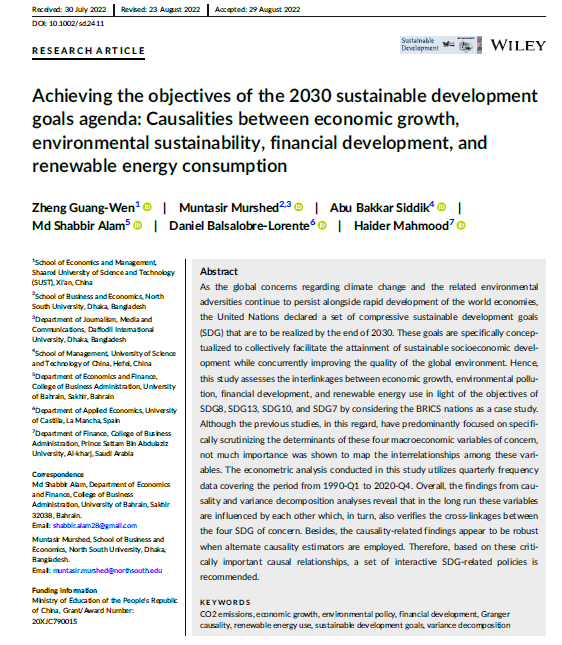Document
What factors cause ocean CO2? A panel data analysis
Title of Periodical
Environmental science and pollution research international
Country of Publication
Kingdom of Bahrain
Place Published
Sakhir, Bahrain
Publisher
University of Bahrain
Date Issued
2023
Language
English
English Abstract
Abstract:
Over the past three decades, industrial innovations and technological advancements have changed business dynamics, adversely devastating the overall environment. As a result, our oceans have been severely afected due to climate change and global warming. To address this issue, this study investigates the factors that cause ocean CO2 using a sample of 44 countries over 2012–2021 and explores a dynamic and causal relationship between economic growth, ocean carbon dioxide emissions, energy consumption, and control variables relating to the ocean industry. This study fnds that increasing economic activity tends to increase ocean carbon emissions. The results support the evidence of the environmental Kuznets curve (EKC) hypothesis suggesting an inverted U-shaped association between ocean emissions and real income for the sample countries. Moreover, this study reports that ocean health index, maritime container transport, trade of fshery and ocean species, aquaculture production and marine species, and employment rate in the fshery processing sector are the signifcant factors of ocean CO2. Region-wise analyses suggest that real income positively infuences ocean emissions and confrm the evidence of
the EKC hypothesis in European sample countries but these relationships have an insignifcant efect in Asia and the Pacifc and the American regions. Furthermore, a short-run unidirectional panel causality fows from the production of aquaculture and other species to RD&D, from OHI and GDP to trade of fshery and other species, and from OHI to employment rate in the fshery sector. Likewise, bidirectional causality runs from energy consumption and maritime transport to ocean CO2 in the long term. Regarding the long-run causal association, the results determine that all of the estimated coefcients of the lagged error correction terms are statistically signifcant which explains that they are crucial in the adjustment process as they deviate from the long-run equilibrium.
Member of
Identifier
https://digitalrepository.uob.edu.bh/id/86de2f11-8df2-4466-b17f-0ddd2e1b2053
Same Subject





